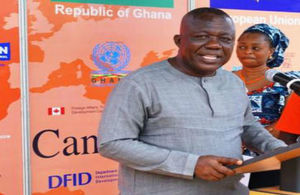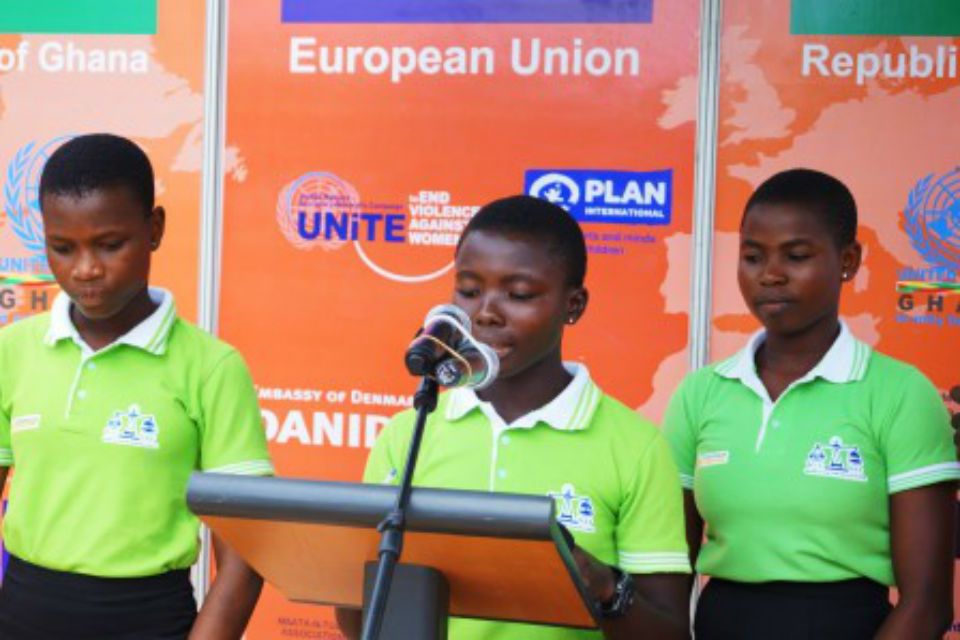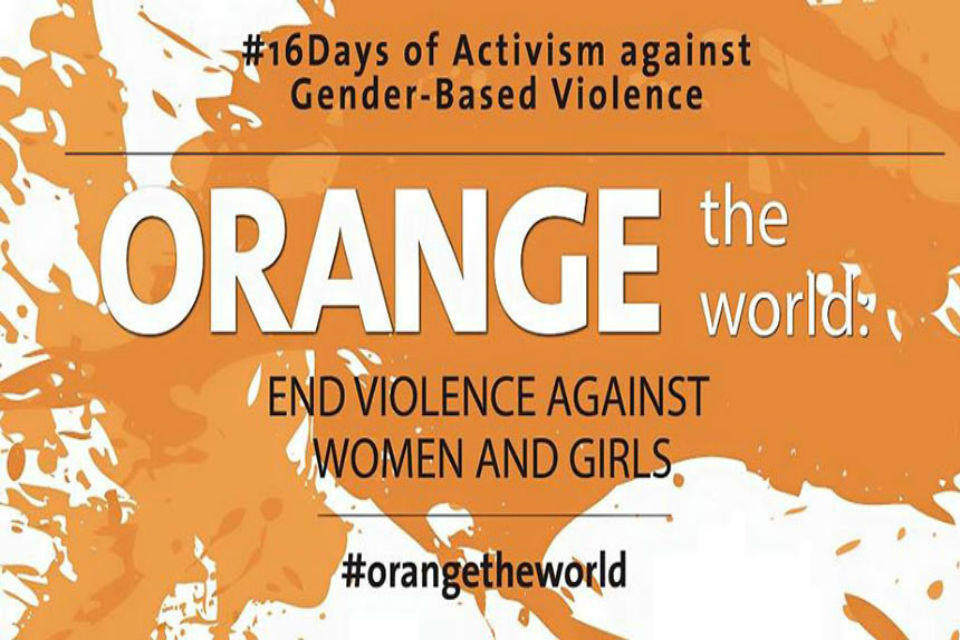Ghana-EU initiative launch to support violence against women campaign
Launch of Ghana-EU initiative in support of global "16 days of Activism - UNiTE to end violence against women" campaign

Deputy Minister, Hon. John Alexander Ackon, on behalf of the Minister of Gender, Children, and Social Protection
Launch of Ghana-EU initiative in support of global “16 days of Activism - UNiTE to end violence against women” campaign
On the occasion of the International Day on the Elimination of Violence against Women and Children, the European Union in Ghana (EU) including Member States represented in the country, the United Nations (UN), the High Commission of Canada and partners from Civil Society launched today the Ghana-EU initiative to support the global campaign dubbed “16 days of Activism - Orange the World, end violence against women and girls”, at a Community Durbar in Ada, Ada East District. The campaign is on from 25 November to 10 December 2015. The Community Durbar was also attended by the Deputy Minister, Hon. John Alexander Ackon, of the Ministry of Gender, Children and Social Protection of Ghana. Together, the partners presented to the communities approaches to preventing violence. This will be followed by a range of initiatives across the country involving local authorities, schools and the media.
Over 300 people from the communities around the Ada East District, gathered to celebrate the launch of the Campaign. “This campaign that we are launching today is not just a renewed effort at ending violence against women and children, it is also an effort aimed at preventing it from happening in the first place”, explained Maria Pilar Palmero Vaquero, Head of Governance, European Union in Ghana, when she opened the Durbar.
The Spanish Ambassador to Ghana, H.E. María Alonso, stated that “the numbers are appalling. In the whole world one out of three women has been the victim of violence ; out of 4,5 million victims of sexual exploitation, 98% are women and girls. 133 million girls have suffered genital mutilation in 29 countries, mainly in Africa and the Middle East and around 700 million women have been victims of forced marriages”. She highlighted that Spain joins this year’s campaign on the elimination of violence against women and children with the following theme: “Free women, women in peace. Act. Gender violence does not distinguish borders.”
The EU is strongly committed to joining the international mobilisation supported by the UN Secretary General and UN Women to raise awareness about gender-based violence as a human rights issue and to strengthen local work around violence against women. This year’s International Day for the Elimination of Violence against Women marks the 20-year anniversary of the Beijing Declaration and Platform for Action, which first laid down a road map for gender equality. “Millions of people across the world are uniting under the banner colour orange, chosen to symbolize the brighter future of a world free from violence against women and girls. This year, in a sign of the growing momentum for change, orange lights will illuminate iconic landmarks from the historic ruins at Petra in Jordan to Niagara Falls in North America.” Ban Ki-Moon, Secretary-General, United Nations.
Ms Palmero Vaquero, Head of Governance, European Union in Ghana, commended the “laudable efforts” made by the Government of Ghana and all partners towards ending violence against women and children in the country. “We are becoming increasingly aware that preventing gender-based violence and protecting survivors requires the support of the entire community”, he noted. The EU is currently spending over EUR 600 000 in support of civil society organisations promoting the protection of the rights of the children including young girls against early and forced marriages.
In a keynote address, the Deputy Minister, Hon. John Alexander Ackon, on behalf of the Minister of Gender, Children, and Social Protection, Hon. Nana Oye Lithur, presented the latest initiatives undertaken by the government to end gender-based violence. Ghana has been involved with the international community in the preparation of the Sustainable Development Agenda replacing the Millennium Development Goals. For the first time, the agenda includes specific targets and indicators on ending violence against women. Ghana adopted a Domestic Violence Act (Act 732) in 2007, but the continued prevalence of violence against women and children is still a source of concern.
The costs of violence against women and children are extremely high. They include the direct costs of services to treat and support abused women and their children and to bring perpetrators to justice. The indirect costs include the deep shame for women and often their families, lost employment and productivity, and the costs in human pain and suffering.
In a session focussing on preventive approaches to avoid gender-based violence, a representative from the Domestic Violence and Victims Support Unit (DOVVSU) from the Ghana Police presented the role of the Unit. Bianca Juhl Andersen, Programme Analyst at the Resident Coordinator’s Office, UN Ghana, congratulated the Government of Ghana on the reduction of female genital mutilation cases in Ghana, and expressed the UN’s continued support to Ghana in their efforts towards eliminating violence against women and girls as part of the post-2015 agenda. Fauzia Issaka, Gender Equality and Social Development Adviser, Department for International Development (DFID) for her part gave an overview of the work undertaken by the United Kingdom to support the Government of Ghana in eliminating violence against women and children including the launch of a new £15 million programme focussing on adolescent girls.
Other speakers included representatives from civil society organisations involved in grass-root community initiatives. Shirley Acquah on behalf of PLAN International, a child-centred organisation working on the protection of children, stressed the need for a “change in mind set, a change in community response to violence and a change in the reporting and handling of victims”. Gloria Dei-Tutu from Society for Women and AIDS in Africa (SWAA) Ghana also addressed the Community to raise awareness on health aspects of violence against women.
Two members of a Girls Empowerment Club, supported by the Women in Law and Development in Africa (WILDAF), Gloria Amarh and Emelia Mensah, Teshie LEKMA “12” Junior High School, closed the session with an appeal “to make Education Safe for All”. As part of their 2015 campaign “From Peace in the Home to Peace in the World: Make Education Safe for All”, they denounced the practice of early and forced marriages “when such girls should be in the class room; thus shattering their dreams of contributing meaningfully to society”.

Teshie LEKMA "12" Junior High School
To close the Durbar, the Non-Governmental Organisation (NGO), Junior Art Council (JAC) active in Italy and Ghana presented a sketch played by children of the Ada Community on the causes of violence and what to do about it using the Theatre for Education Methodology.
The 16 Days of Activism to end violence against women and children in Ghana will include numerous awareness events across the country organised by a wide range of partners, such as the United Nations in Ghana, the High Commission of Canada to Ghana and EU-funded organisations, International Needs and Maata-N-Tudu Association.
Campaign Background
16 Days of Activism Against Gender-Based Violence
The 16 Days of Activism Against Gender-Based Violence is an annual international campaign running from 25 November - the International Day for the Elimination of Violence Against Women - to 10 December - Human Rights Day. The first campaign was launched in 1991 by the Women’s Global Leadership Institute. To mark the 16 Days Campaign, the UN Secretary-General launched the UNiTE to End Violence Against Women calls for global campaigns. The 2015 Call to Action is “Orange the World: End Violence against Women and Girls”.

For more information, visit the UN Women Campaign Page